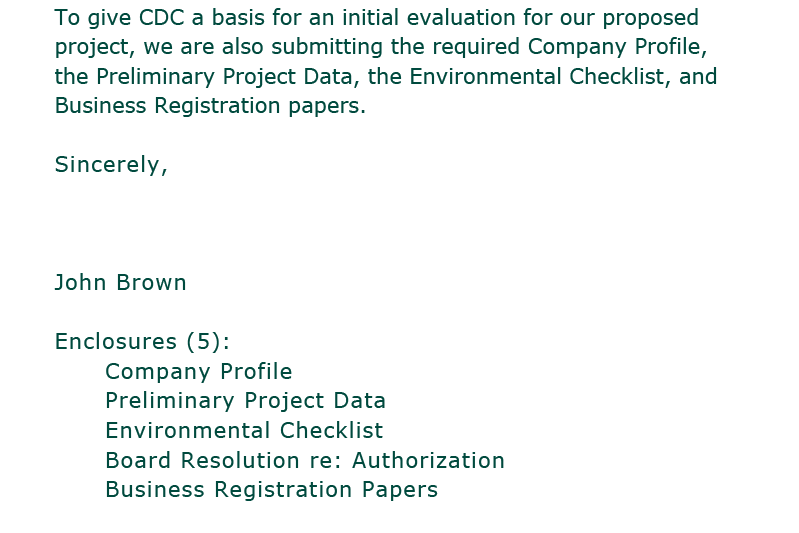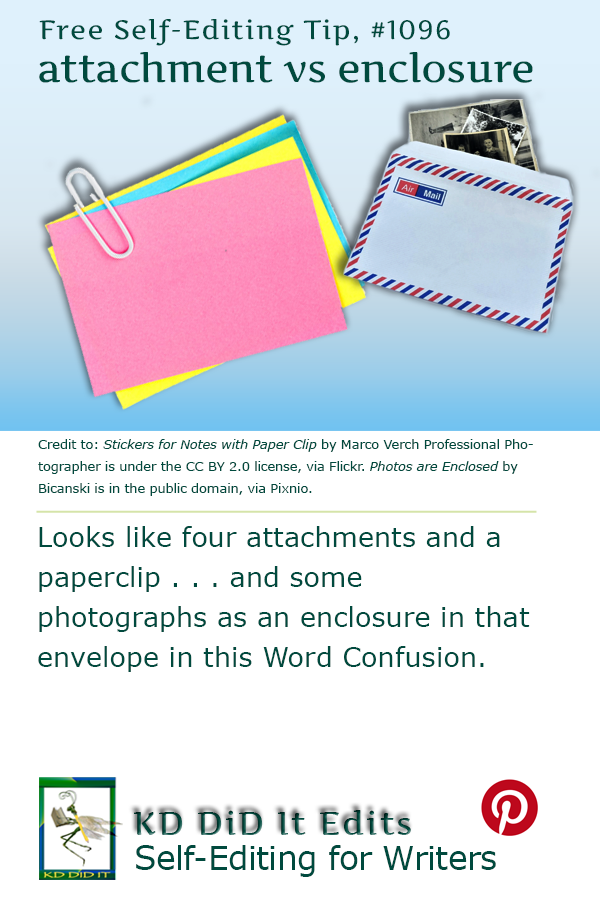I ran across a website, the Business Writing Blog, stating that attachments vs enclosures are different. I don’t know about you, but I had no clue. Faraday states that understanding the difference between the two will give your work a more competitive edge and a sense of professionalism. It is a small detail, but one that separates the experienced from inexperienced office worker.
An attachment never stands alone and is an explanation or an extension of the letter’s content and can highlight its key points with the writer referring to the documents attached in a business letter. It is an external document that sheds more light on the content of the business letter, e.g., a data spreadsheet detailing more information or bank information confirming a particular financial claim.
Attachments are frequently referred to alphabetically, e.g., “Attachment A”. If you do choose the alphabet, be sure to include the reference on the actual attachment in the header.
An enclosure stands alone even though they are included in the letter but not necessarily referred to in the letter. Examples of enclosures include a cover letter for your résumé, a brochure, photos, certificates, a market survey chart, etc.
Additional Pointers When Dealing With Attachments/Enclosures
Type your attachment/enclosure two line breaks below your name or signature.
Use the title of the document(s) as the title of the attachments/enclosures if you are listing them — and as they appear in your document. You want the recipient to easily understand which document is what.
By noting your attachments/enclosures as they appear, everything is kept in order and are as clear and concise as possible making for a better organized and more easily accessible document.
Restrain from including too many attachments/enclosures when writing a business letter. If you include too many, the recipient may feel overwhelmed and not even look at them. And sometimes ya just gotta go for broke, so if you need a second page to note all the attachments/enclosures, indicate “Attachments: Page 2” at the top of the second page. And “Attachments: Page 3”, “Page 4”, etc., lol.
And just to confuse things even more, use attachment(s) with emails, but not enclosure(s), because of the mechanics of attaching files to an electronic letter/memo.
Word Confusions . . .
. . . started as my way of dealing with a professional frustration with properly spelled words that were out of context in manuscripts I was editing as well as books I was reviewing. It evolved into a sharing of information with y’all. I’m hoping you’ll share with us words that have been a bête noire for you from either end.
If you found this post on “Attachment versus Enclosure” interesting, consider subscribing to KD Did It, if you’d like to track this post for future updates.
| Attachment | Enclosure |
|---|---|

— |

— |
| Part of Grammar: | |
| Noun
Plural: attachments |
Noun
Plural: enclosures Alternate spelling: inclosure, inclosures |
POST CONTENTS Part of Grammar Definition Used-in-a-Sentence Examples Citing
|
|
An external document(s) or file(s) always mentioned in the letter (and considered part of the letter), as enhancing or further explaining information contained in the letter
|
A document or object placed in an envelope together with a letter but not necessarily referred to or explained in the letter — and it is considered a separate document, NOT part of the letter |
| Examples: | |
| There is an attachment, a data spreadsheet detailing statistics in the bank information, confirming your financial claim.
See the attached contract for further information. Both of these attachments offer explanations or are an extension of the letter’s content and can highlight its key points. |
Be sure to include a cover letter as an enclosure when you send out your résumeé.
Hey, Jim, be sure to send that market survey chart as an enclosure. Always include a brief enclosure citation to alert the reader that there is/are additional document(s) that come with the letter. |
| Citing | |
| Citing refers to noting your attachments/enclosures that you are including two line breaks below the writer’s name at the bottom of the letter/email.
This helps the recipient navigate your content with minimal effort. Not to mention, citing an attachment/enclosure lets a recipient know when they may be missing a document. It also makes a useful checklist so you can ensure you’ve included everything. |
|
| Informal | |
| In an informal letter to someone, in the body of the letter, inform the recipient that you attached/enclosed something — or how many somethings. | |
| Government Correspondence | Formal |
Place attachment citations at the bottom of letters, usually two line breaks below the writer’s signature or initials.
|
Place enclosure citations at the bottom of letters, usually two line breaks below the writer’s signature or initials. |
| Referring to Attachment in Body of Letter/Email | |
Whether using email or a hard copy letter, cite the information from your attachment in the body of the letter using parentheses or commas to encase the file or document name and any relevant date.
|
|
| (Attachment: Customer Service Journal, 1/5/2017)
, Attachment: Customer Service Journal, 1/5/2017, |
|
| Citing Examples: | |
| Some business writers suggest enclosing the enclosure citation in parentheses; some don’t recommend the parentheses. Whichever you choose, be consistent. | |
| Abbreviations / Multiples | |
| Single: Attachment, Attach, Attach., ATCH, ATCH., AT, AT., att, att., or ATTM, ATTM.
Multiple: Attachments, Attachs, Attachs., ATCHs, ATCHs., ATs, ATs., atts, atts., or ATTMs, ATTMs. |
Single: Enc, Enc., Enclosure, or Encl, Encl.
Multiple: Encs, Encs., Enclosures, or Encl, Encls, Encl., Encls. |
| Whether you use a period at the end of any of the abbreviations depends on the punctuation style used in the body of the letter. Also note that British English doesn’t use a full stop while American English may or may not choose to use the period. Just be consistent. | |
| Single Attachment/ Enclosure Uses Title | |
| Attachment: Garden Expenses, 5/31/2018
(Attach: Garden Expenses, 5/31/2018) ATTMs: Garden Expenses, 5/31/2018 How Plants for 2018 Fared, 10/2/2018 |
(Enc: Human Rights Movement Journal, 4/8/2001)
(Enclosure: Human Rights Movement Journal, 4/8/2001) Encl: Human Rights Movement Journal, 4/8/2001 |
| Multiple Attachments/Enclosures with Number | |
| Indicates more than one attachment, letting the recipient know there is more than one attachment in case one or more is missing:
(Attachments: 4) Attachments: 3 Attachments (3) 2 Attachments 3 Attachments |
Indicates more than one enclosure, letting the recipient know there is more than one enclosure in case one or more is missing:
(Enclosures: 4) Enclosures: 3 Enclosures (3) 2 Enclosures |
| Multiple Attachments/Enclosures with Titles | |
| Attachments: Résumé of Steve Jobs, List of Awards and Achievements
Attachments: Résumé of Steve Jobs List of Awards and Achievements |
Another option is to include the easily recognizable titles (but NOT the total number):
(Enclosures: product brochure (1), product photos (2)) Enclosures: Product brochure (1) Product photos (2) |
| Document Cited in Letter Not Included | |
| (w/o Enclosures) | |
| Request Return of an Original Document | |
| If an original document is one of the enclosures, request its return and mention somewhere in the body of your business letter, preferably towards the end of it, that you need the original document returned.
(Enclosures: Human Rights Movement Journal, Birth certificate (original plus two copies), Receipt dated July 11, 2017; photos (2)) Encs: Original Academic Transcripts (with two additional photocopies) |
|
| Derivatives: | |
| Verb: attach, attached, attaching | Verb: enclose, inclose |
| History of the Word: | |
| Late Middle English, in the sense arrest for contempt of court, from the Old French attachement, from atachier meaning fasten, fix. | Late Middle English from the legal Anglo-Norman French and the Old French, from enclos meaning closed in. |
C’mon, get it out of your system, bitch, whine, moan . . . which words are your pet peeves? Also, please note that I try to be as accurate as I can, but mistakes happen or I miss something. Email me if you find errors, so I can fix them . . . and we’ll all benefit!
Satisfy your curiosity about other Word Confusions on its homepage or more generally explore the index of self-editing posts. You may also want to explore Book Layout & Formatting Ideas, Formatting Tips, Grammar Explanations, Linguistics, Publishing Tips, the Properly Punctuated, Writing Ideas and Resources, and Working Your Website.
Resources for Attachment versus Enclosure
Apple Dictionary.com
“‘Encl’ (Enc, Encls) in a Cover Letter: Meaning and Examples.” Linguablog. n.d. Web. 22 July 2022. <https://linguaholic.com/linguablog/encl-enc-encls-in-a-cover-letter/>.
Faraday, Michael. “How to Cite Enclosures In Business Letters.” Business Writing Blog. Sept 2020. Web. 18 July 2022. <https://www.businesswritingblog.com/business_writing/2020/09/how-to-cite-enclosures-in-business-letters.html>.
Mueller, Jennifer and JD. “How to Note Enclosures in a Letter.” Business Letters. Business Writing. Wiki How to Do Anything. 29 Aug 2019. Web. 22 July 2022. <https://www.wikihow.com/Note-Enclosures-in-a-Letter>.
Pinterest Photo Credits:
Stickers for Notes with Paper Clip by Marco Verch Professional Photographer is under the CC BY 2.0 license, via Flickr. Photos are Enclosed by Bicanski is in the public domain, via Pixnio.
Revised as of 4 Apr 2024
By: Kathy Davie

